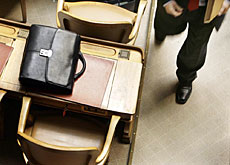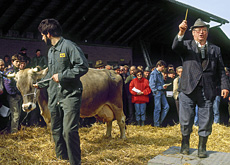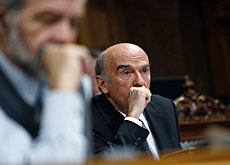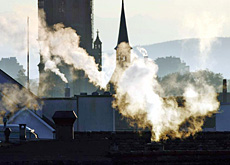Parliament ambivalent on environmental issues

Environmental issues, including a levy on greenhouse gas emissions were high on the agenda of parliament's regular winter session which ended on Wednesday.
Discussions about the budget and elections also marked debate in the House of Representatives and the Senate.
The Senate followed the House in agreeing the introduction in stages of a controversial tax on carbon dioxide emissions but only if greenhouse gases from fossil fuels are not reduced by other means to 1990 levels within three years.
As of 2009 heating oil will be taxed by six centimes per litre and nine centimes in 2010. The annual revenue, estimated at SFr600 million, is to be redistributed to families and the economy.
Ahead of the debate there was uncertainty whether the Senate would insist on its own proposal and effectively block attempts for a compromise. The government which adopted the Kyoto protocol on reducing greenhouse gases, wanted a flat rate.
Parliament gave environmental organisations the cold shoulder when it decided to restrict their right of appeal in zoning and building matters.
The issue came to the fore more than two years ago when green groups managed to block the construction of a new football stadium in Switzerland’s largest city, Zurich.
As a result the centre-right Radical Party which is considered close to the business community, has been pushing for measures to limit the influence of environmental organisations.
Under the new law only groups with years of expertise are allowed to file an appeal and they have to pay legal fees if they lose their case.
For its part the Senate also debated government plans to reform the farming sector. But it came out against cuts in the agricultural budget and proposals to transform export subsidies into payments which are not directly related to production output.

More
House of Representatives
Budget surplus
Both parliamentary chambers houses agreed next year’s budget which foresees a surplus of SFr904 million ($752 million). Parliamentarians followed the cabinet and agreed to cut spending on development aid despite protests by the centre-left.
To the general surprise the Senate showed little enthusiasm to debate individual points of the budget but approved extra spending for cultural and education projects.
This year the federal accounts are expected to end in a slight surplus for the first time since 2000.
Finally, parliament decided to grant another SFr2.5 billion for the European Union research programme 2007-2013.
The Swiss contribution is 60 per cent up on the current seven-year programme and makes up 2.8 per cent of the overall EU research budget of €54.6 billion.
Switzerland has been taking part in the programme since 1992 and became an associate member after it agreed a bilateral treaty two years ago.
The rightwing Swiss People’s Party tried to block the funds but failed to win a majority. Opponents criticised the administrative burden for the projects and called for increased efforts to involve small- and medium-sized businesses in the research programme.
Supporters argued there was a 100 per cent return on investment from the participation in EU projects and they helped to create new jobs in Switzerland.
swissinfo

More
Senate
The winter parliamentary session took place from December 4-20, 2006.
After an extraordinary session in the mountain resort of Flims in autumn, both chambers were back in the capital Bern.
Parliament will meet again next March.
Traditionally parliament names its new speakers and the Swiss President during the winter session.
Christine Egerszegi was elected as speaker for the House of Representatives and Peter Bieri chairs the Senate for a one-year term.
The Swiss president in 2007 is Foreign Minister Micheline Calmy-Rey. The Social Democrat from Geneva is only the second woman in Swiss history to hold the post, which is largely ceremonial.

In compliance with the JTI standards
More: SWI swissinfo.ch certified by the Journalism Trust Initiative



You can find an overview of ongoing debates with our journalists here. Please join us!
If you want to start a conversation about a topic raised in this article or want to report factual errors, email us at english@swissinfo.ch.